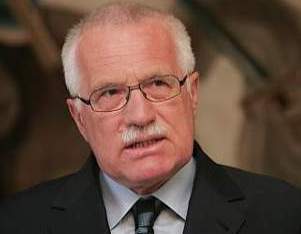ROUNDUP: Czech president wants quick solution to government crisis
 Prague - Czech President Vaclav Klaus said Thursday he preferred to find a quick but lasting solution to the political crisis, rather than keep outgoing Prime Minister Mirek Topolanek in a caretaker role until the end of Prague's stint as president of the European Union.
Prague - Czech President Vaclav Klaus said Thursday he preferred to find a quick but lasting solution to the political crisis, rather than keep outgoing Prime Minister Mirek Topolanek in a caretaker role until the end of Prague's stint as president of the European Union.
"I will not allow a lack of a solution ... such as maintaining the current, provisional state ... until the end of our presidency," Klaus said after accepting Topolanek's cabinet resignations earlier in the day.
Klaus, a vocal sceptic of EU integration who now gets to pick the next premier as kingmaker of Czech politics, said a quick deal was needed during times of economic crisis and suggested he would not wait until fresh elections are held.
Instead, he would appoint a politician able to garner a majority in parliament without relying on unpredictable deputies, as had been the case with Topolanek's cabinet.
"If Mirek Topolanek or someone else will be able to bring me at least 101 signatures (in the 200-seat lower house) ... I would give him a chance," the president said.
Klaus's demands are set to complicate matters for Topolanek, who would have to make a deal with his bitter rivals, the opposition Social Democrats, in order to put together a viable government.
Social Democratic leaders have already said that they would not back another Topolanek-led cabinet. And long-standing animosities are likely to impair any attempts at making a deal.
The outgoing premier said that he preferred quick early elections, in an apparent acknowledgment of his slim chances at forming the new cabinet.
The political crisis, resulting from domestic squabbles, may have serious implications abroad, with Toplanek's demise threatening the future of the EU's reforming Lisbon Treaty.
The treaty is one of the reasons for Topolanek's fall, with one of his party's renegade lawmakers citing it as his justification for voting down the government.
The lawmaker, Jan Schwippel, is among Klaus' followers within Topolanek's Civic Democratic Party who reject the treaty and further integration of the 27-member bloc.
On Wednesday, soon after losing a no-confidence vote in parliament, Topolanek accused the president of playing a part in his cabinet's collapse.
"Nobody can doubt" Klaus's role in toppling the cabinet, he told Czech television. In another interview he said that his fall was being celebrated at Klaus's "Prague Castle" as well as "in the Kremlin."
If Topolanek, who inked the treaty on behalf of the Czech Republic in December 2007, loses sway within his party, the accord's eventual ratification in Prague may be doomed, analysts say. All 27 EU member states must ratify the treaty for it to come into effect.
Besides possible Czech resistance to the Lisbon Treaty, Irish voters last year rejected the treaty in a referendum.
Topolanek's fall is also likely to weaken the EU's six-month presidency, which the Czech Republic holds until the end of June.
Adding to the difficulties, Russian Foreign Ministry spokesman Andrei Nesterenko said Thursday that the Czech political troubles may "break up" an EU-Russia summit set for May 21-22.
Topolanek was meant to represent the EU at an April 2 meeting of Group of 20 economies in London and to host US President Barack Obama at an EU-US summit in Prague on April 5.
His loss of power could also issue a deadly blow to Czech-US treaties allowing the United States to place a missile defence radar base on Czech soil. (dpa)